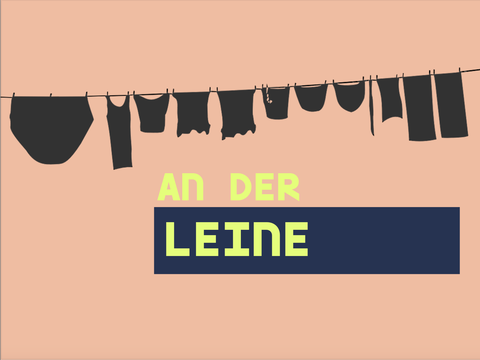27.09.2024
#80 An der Leine
Kürzlich hatten wir eine Idee, bei der eine Wäscheleine eine zentrale Rolle in einer interaktiven, künstlerisch-politischen Installation spielt. Die Installation verwandelt einen öffentlichen Ort wie eine Bushaltestelle in einen temporären Begegnungsort und lädt dazu ein, über Themen wie Care-Arbeit, soziale Ungleichheit, Bodyshaming oder Nachhaltigkeit ins Gespräch zu kommen.
Die Idee geht so: An einem öffentlichen Ort wird eine überdimensionale Wäscheleine gespannt. Alternativ kann auch einfach ein Wäscheständer an einer Bushaltestelle aufgestellt werden. Beide Varianten können unterschiedlich bespielt werden.
Eine Möglichkeit wäre, die Leine als performative Intervention zu bespielen, zum Beispiel indem ein Wäschekorb mit nasser Wäsche daneben gestellt wird mit einem Zettel und der Aufschrift: „Hatte keine Zeit, bitte aufhängen und nach dem Trocknen wieder abnehmen und zusammenlegen“. Je nachdem, wie der Wäschekorb bestückt ist, ergeben sich unterschiedliche Erklärungen oder Vermutungen über die Gründe und die Person dahinter. Denn jedes Kleidungsstück erzählt eine andere Geschichte über Zeitmangel, finanzielle Sorgen oder Ansprüche an Sauberkeit und Aussehen in unterschiedlichen sozialen Kontexten. Das Bild oder die Vorstellung, die von der Person entsteht, könnte zwischendurch auch immer mal von einer auftretenden Performer:in gebrochen werden.
Eine andere Möglichkeit die Wäscheleine oder den Wäscheständer zu bespielen, wäre, sie als offenen Kleidertauschplatz zu gestalten, an dem Menschen aus der Nachbarschaft Kleidung aufhängen oder mitnehmen können und so zum Nachdenken über Konsum(möglichkeiten) und Nachhaltigkeit angeregt werden. Kleidung, die sonst ungenutzt zu Hause herumliegt, bekommt eine neue Bedeutung und wird zum Symbol für das Teilen und die gegenseitige Unterstützung in der Nachbarschaft.
Eine weitere Möglichkeit wäre, die Leine als temporären Ausstellungsraum zu nutzen, um Geschichten über Freiheit und Zwänge auszustellen, die vor Ort gesammelt werden. Die Idee könnte auch mit aufzuhängender oder bereits aufgehängter Wäsche verbunden werden, indem gefragt wird, welche Geschichten, die einzelnen Stücke über soziale und individuelle Freiheit und sozioökonomische, kulturelle oder patriarchale Zwänge erzählen.
Das Projekt könnte auch in Kooperation mit lokalen Initiativen, Stadtteilzentren, feministischen Organisationen und Sozialverbänden durchgeführt werden, um reale Alltagsgeschichten von Betroffenen zu sammeln und sichtbar zu machen.

